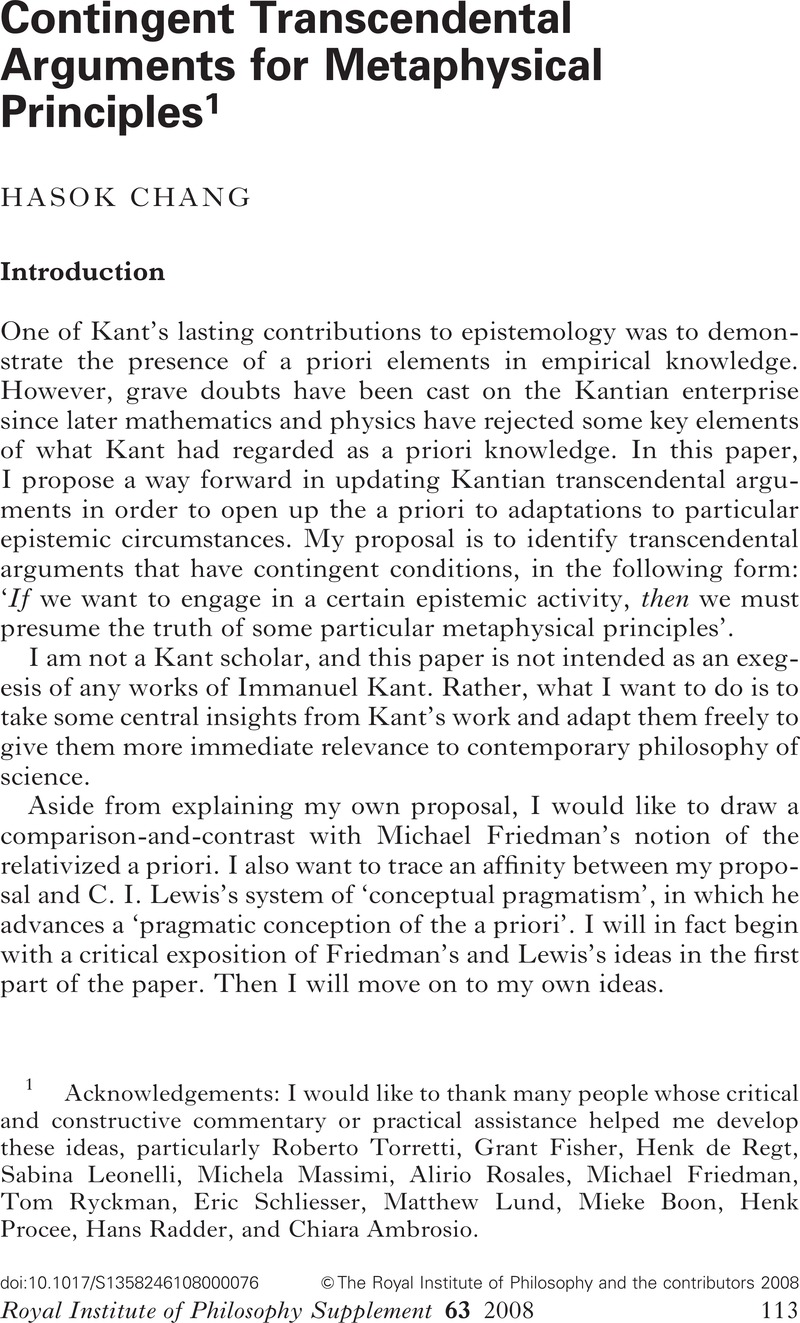Published online by Cambridge University Press: 16 October 2008

2 Frank (1949), ch. 12, pp. 207–215.
3 See De Regt and Dieks (2005), pp. 159–162, for an instructive discussion of the context-dependence of intelligibility.
4 Friedman (2001a), p. 66.
5 Friedman (2001a), p. 67; emphases added.
6 Kellert et al. (2006) represents a significant start on the debate on scientific pluralism.
7 See, for example, the discussion of the Chemical Revolution in Friedman (2001a), pp. 124–5.
8 Feyerabend (1975), chs. 2–3, and pp. 65–8, 77–8.
9 Since C. I. Lewis is no longer a household name even among professional philosophers, I give here a few basic facts of his life, taken from his autobiographical notes in Schilpp (1968). Lewis was born in 1883 in Stoneham, Massachusetts, son of a shoemaker. He studied at Harvard, where his teachers included Josiah Royce and William James. After a brief spell teaching English, he returned to Harvard for graduate study, completing his Ph.D. in 1910. In 1911 he went to the University of California at Berkeley to teach philosophy, and composed The Survey of Symbolic Logic to help his teaching. He returned to Harvard in 1920, where he taught until his retirement in 1953. He gave an account of his ‘conceptual pragmatism’ in his Mind and the World Order in 1929, and published An Analysis of Knowledge and Valuation in 1946. He died in 1964.
10 Beck (1968), p. 273.
11 I do hope to engage in a more general study of Lewis's ideas, following up on some recent scholarship such as Rosenthal (2007) and Murphey (2005).
12 Lewis (1929), p. 231; emphasis original.
13 Lewis (1929), pp. 239–240.
14 Lewis (1929), pp. 240–241.
15 Lewis (1929), p. 256.
16 Lewis (1929), pp. 233–234.
17 Lewis (1929), p. 232.
18 Lewis (1929), p. 236.
19 Lewis (1929), p. 197.
20 Quoted in Lewis (1929), p. 256.
21 Lewis (1929), p. 197; emphasis original.
22 Lewis (1929), p. 268; emphasis original.
23 Lewis (1929), p. 247: ‘the ultimate criteria of the laws of logic are pragmatic. Indeed, how could they be anything else?’
24 Lewis (1929), p. 239; emphases added.
25 Lewis (1929), p. 252.
26 Friedman (2001a), p. 63.
27 Friedman (2001a), p. 64.
28 Lewis (1929), p. 240.
29 Lewis (1929), p. 248.
30 Private communication, June 2007.
31 Grene (1974), ch. 5.
32 Chang (in press).
33 Allison (2004), pp. 11ff, and chapter 6.
34 I want to argue that other types of impossibility are actually grounded in pragmatic impossibility, being metaphorical extensions of the latter. This is why it would be futile to try to analyze pragmatic impossibility further. In working out the notions of necessity and possibility sketched here, I would like to build connections to Roberto Torretti's ideas on the subject, as expressed in Torretti (1990), chapter 5.
35 See Chang (2001), pp. 11, 18. In experimental practice, ‘disagreeing’ means differing so much as to go beyond the admitted margin of error. I have shown how this principle has done useful work, although it might seem entirely vacuous (Chang 2001, pp. 17–22).
36 Chang (2001), pp. 18–22. I thank Roberto Torretti (private communication, March–April 2005) for getting me to think about this point in a fresh way.
37 Lewis (1929), p. 246, puts it: ‘The law of contradiction tells us that nothing can be both white and not white, but it does not and can not tell us whether black is not white….’
38 See Salmon (1988), from which I also take the phrase ‘rational prediction’.
39 Reichenbach (1935), English transation (1971), pp. 469ff.
40 Depending on the exact formulations, it could be that the principle of sufficient reason is just the contrapositive of the principle of uniform consequence.
41 My thinking about this particular activity–principle pair was inspired by the work of Georgette Taylor on affinity tables in eighteenth century chemistry.
42 Whether the will itself is free or not is a separate question. Along vaguely Kantian/Jamesian lines I would imagine that the freedom of the will is a metaphysical principle concomitant to the activity of making moral judgments (cf. Carlson 1997, pp. 374–375).
43 I thank Roberto Torretti for this suggestion.
44 I had conceived the relevant epistemic activity here as deductive inference, but have revised my view on Roberto Torretti's suggestion.
45 The limitations are similar for any other kind of compositional reductionism. See, for example, the anti-reductionist arguments in Dupré (1993), chapter 4.
46 For a convenient selection of Whewell's writings relevant to this issue, with a brief introduction, see Kockelmans (1968), pp. 47–79.
47 Friedman (2001a), esp. part 2, ch. 1.
48 See Carlson (1997) for an insightful argument that there were significant Kantian elements in William James's thinking, despite the latter's renunciation of Kantianism.
49 This is reminiscent of Duhem's argument that when we witness the extensive organization of phenomena through a successful theory, ‘it is impossible for us to believe that this order and this organization are not the reflected image of a real order and organization’. See Duhem (1906), English translation (1962), pp. 26–8; he also cites Poincaré in that discussion.
50 Bergson (1907), English translation (1911), p. 12; emphases original.